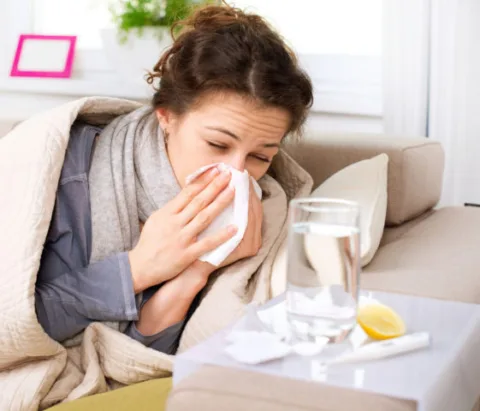You may be wondering… how do you die from the flu?
If you’re curious what would have to happen that would cause you to die from the flu, the truth is it’s kind of scary how many ways a flu can directly (or indirectly) kill you.
The researchers at Live Science explain how you can die from the flu and, really, it’s pretty gruesome:
- The flu can inflame your lungs, making it impossible for enough oxygen to get into your bloodstream, causing death.
- The flu can cause multiple organ failure, shutting your body down and causing the vital functions that keep you alive to cease.
- If the flu inflames your heart, your brain, or other parts of your body, then you could die. The flu can also cause dangerous, body-wide inflammation known as sepsis.
- In people with weakened immune systems, the flu can cause other problems, such as pneumonia — secondary infections can kill you in as little as a week after getting the flu.
So, actually, there are many ways the flu can lead to death — and this pretty much explains why the flu shouldn’t be taken lightly.
How does flu kill, and why does it sometimes kill so quickly? Doctors who study the body’s immune response say there are 3 main reasons: 1) co-infection with another germ, usually bacteria such as strep; 2) aggravation of existing conditions such as heart disease and asthma; and 3) a so-called cytokine storm, marked by an overwhelming immune system response to infection. Source
To give you a better idea of just how serious the flu can be, the Centers for Disease Control (CDC) reports:
- Between 140,000 to 710,000 Americans are hospitalized due to the flu each year.
- The flu has killed 12,000 to 56,000 people in the U.S. each year.
As many as 50 million people around the world (more than 650,000 Americans) died of the flu pandemic in 1918. It was the deadliest flu outbreak in history. Of course, that was before the flu vaccine, which was invented in the 1930s.
Which begs the question… have you gotten a flu shot?
As of this writing, I still haven’t gotten one.
It’s not like I get the flu very often. Colds, yes. But the flu — I haven’t had the flu in years! Some might say that I’m tempting fate by not getting flu shots.
Maybe you’re one of those people who, like me, heard about people getting sick after the flu shot. Maybe you’ve even had family members and friends who’ve gotten flu shots and got sick days or weeks later.
It seems there are a bunch of flu shot myths out there and tons of misinformation. So I set out to arm myself with some facts before deciding whether or not to get the flu shot myself.
I’m going to help you make sense of the flu virus and flu shots by providing information that you really need to know stay healthy:
- Who should get a flu shot?
- What are the benefits of getting a flu shot?
- What do flu shots protect against?
- How much does it cost to get a flu shot?
- Where can you get a flu shot?
Who Should (And Who Shouldn’t) Get A Flu Shot?
I’m not a doctor nor any other kind of medical professional, so I’m in no position to tell you whether or not getting a flu shot is right for you or your loved ones.
While I’ve never personally had any flu shots, there are several people close to me who have — including my fiancée who is nursing assistant, and my mom who underwent chemotherapy for Stage IV colon cancer.
I don’t have an aversion to vaccines. In fact, you could call me pro vaccine!
Many people seem to be avoiding vaccines these days. Some take an anti-vaccine stance due to conspiracy theories and myths. Others have religious objections or other personal reasons they avoid getting flu shots.
These are my main reasons for not getting a flu shot:
- I generally don’t get the flu (…but there’s that nagging voice in my head that knows a flu shot is still good insurance against getting the flu even though I’ve been fortunate so far).
- Flu shots can be expensive.
- Flu shots generally protect against only certain strains of the flu.
- I’d rather not be poked with a needle if I can avoid it.
- My job is such that I’m not working in close proximity with many people. (I work from home.)
My point? I’m not at all against flu shots, I just haven’t personally made the choice to get one at this time. Maybe my mind will change before the next flu season.
For the record, the Centers for Disease Control & Prevention (CDC) says, “All persons aged 6 months or older are recommended for annual vaccination, with rare exception.”
Those “rare exceptions” are:
- Children under 6 months of age, who are too young for the flu vaccine.
- Individuals with severe or life-threatening allergies to flu vaccines or ingredients in the flu vaccine — including gelatin and antibiotics.
Then, there are people who may be able to get the flu shot but should consult with their doctor first:
- People with egg allergies
- Those who’ve had the paralyzing illness known as Guillain-Barré Syndrome
- Anyone who isn’t feeling well at the time they’re considering getting a flu shot
Is It Worth Getting A Flu Shot?
I’ve waffled back and forth about whether I should get a flu shot or not. I mean, is it even worth it if a single flu shot doesn’t protect against all strains of the flu? What about the cost of the flu shot? Not to mention the fact that I’ve had a few people who told me they got sick after getting a flu shot.
So, really — is the hassle and cost of getting a flu shot worth the trouble?
Here are some things to consider:
1. Peak flu season is usually December through February — but flu seasons sometimes start as early as November and go as late as May.
2. You could actually get the flu twice in the same season (oy vey!)
We’ve said it before and we’ll say it again: It’s not too late to get your flu shot. That applies even if you already had the flu once this season. Despite getting the flu, you are still eligible and should get the flu vaccine. This will provide added protection against the strain of the flu you had, in addition to protecting you from the other strains of influenza that are circulating. Source
3. It’s possible to get the flu at any time of the year — not just during the traditional “flu season”. Yep, it’s been determined there are some seasonal flu viruses that can be detected year-round! (Whoopee.)
4. A flu shot doesn’t guarantee that you won’t get the flu. But rather, if you do happen to get the exact strain of flu that is going around after getting a flu shot, then your symptoms will be less severe than if you had not gotten a flu shot that year.
Perhaps the biggest misconception of all is that during the flu season, every time you get a fever, headache, sore throat, cough, and a tired, achy feeling all over, you probably have influenza that could have been prevented with a flu shot. The truth is that, when doctors get suspected cases of influenza tested in labs, more than 70% of the time it is not type A or B influenza but another virus or bacteria causing a respiratory flu-like illness that is mistaken for influenza. Source
5. Flu shots vary in their effectiveness each year. While there’s no guarantee that it’s going to protect everyone from illness — for the most part, the flu shot does save a lot of lives and helps to avoid a lot of serious flu cases.
Recent studies show [the flu] vaccine reduces the risk of flu illness by about 40% to 60% among the overall population during seasons when most circulating flu viruses are like the vaccine viruses. Similar reductions against hospitalization have been observed too. Source
6. It takes about 2 weeks for the flu shot to take effect — because it takes your body that long to develop disease-fighting antibodies against the flu. So… you could go out right now and get a flu shot, then become ill in a few days from a flu virus you picked up tomorrow, before the vaccine has a chance to protect you. Which means if you know of someone who got the flu right after getting a flu shot, it’s probably because they were already exposed to the virus and would’ve gotten it anyway before the vaccine could take effect.
Flu Shot Side Effects
While you cannot get the flu from a flu shot (because the flu vaccine contains inactive flu viruses), virtually every medicine has some side effects — and flu shots are no different.
Here’s a list of potential flu shot side effects, according to the CDC:
From the flu shot injection
- Soreness, redness, or swelling at the vaccination site
- Low-grade fever
- Aches
From the nasal flu vaccine
- Runny nose
- Headache
- Sore throat
- Cough
- Wheezing, vomiting, fever (in children)
Where Can You Get A Flu Shot? How Much Will It Cost?
Doctors, clinics, outpatient medical offices, drugstores, grocery stores, and even big-box stores offer flu shots.
Generally, flu shots cost $100 or less without insurance — though there are many cheaper options out there, even if you don’t have insurance.
Many places offer cheap flu shots for less than $50:
- Sam’s Club
- Costco
- Wegmans
- Walmart
- Kmart
- Walmart
- Meijer
- Safeway
- Publix
- Kroger
- ShopRite
- CVS
- Walgreens
- Target
The Obamacare Affordable Care Act requires free flu shots for anybody with insurance. You may also find free flu shots at these places:
- Your employer
- Your school
- Your county health clinic
- A local charitable organization
The Bottom Line…
It’s important not to overlook the fact that the flu’s toll is measured in dollars, too.
Americans spend $10 billion or more each year paying for hospitalizations and outpatient medical costs due to the flu.
And we pay for the flu not just in dollars and cents, but also time. For example, most people will start experiencing symptoms 1 to 4 days after contracting the virus and may be contagious for up to 10 days after the flu illness begins. That’s a lot of time laid up at home in bed!
More Info About Flu Shots
In addition to the links I’ve included above, here are some other resources to help you decide if getting a flu shot makes sense for you:
- 7 Myths About The Flu Vaccine & Why You Should Get It Anyway
- The Difference Between The Flu, Stomach Flu, And A Cold
- Flu Myths Busted
- Here’s How People Die From The Flu
- It’s Not Too Late To Get A Cheap Flu Shot
- How To Get Rid Of The Flu Virus In Your Home
- The Flu Shot Is Still The Best Protection We Have









